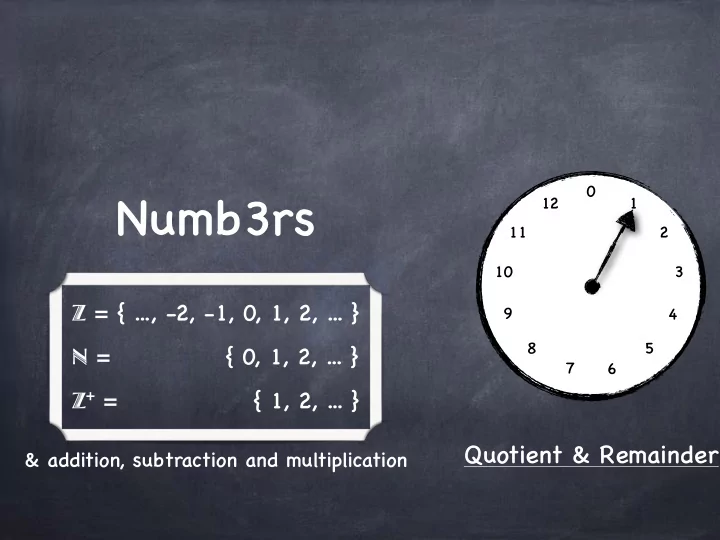

Numb3rs 0 12 1 11 2 10 3 Z = { ..., -2, -1, 0, 1, 2, ... } 9 4 8 5 N = { 0, 1, 2, ... } 7 6 Z + = { 1, 2, ... } Quotient & Remainder & addition, subtraction and multiplication
Divisibility Definition: For n,d ∈ Z , d|n (d divides n) if ∃ q ∈ Z n = qd d|n ≡ n is a multiple of d ≡ d is a divisor of n a.k.a. a factor -12 -6 -4 -3 -2 -1 1 2 3 4 6 12 -24 -12 0 12 24 e.g. Multiples(12) = { …, -24, -12, 0, 12, 24, … }. e.g. Divisors(12) = { ±1, ±2, ±3, ±4, ±6, ±12 }. Divisors(0) = Z [ ∀ d ∊ Z d|0]. Multiples(0) = {0} [ ∀ n ∊ Z 0|n ↔ n=0]
Divisibility n = qm ⇒ nn’ = q’m, where q’=qn’ Proposition: ∀ m,n,n’ ∈ Z if m|n, then m|nn’ n = qm & n’ = q’m ⇒ n+n’ = q’’m, where q’’=q+q’ Proposition: ∀ m,n,n’ ∈ Z if m|n and m|n’, then m|(n+n’) n = qm & n’ = q’n ⇒ n’ = q’’m, where q’’=qq’ Proposition: ∀ m,n,n’ ∈ Z if m|n and n|n’, then m|n’ nn’ = qmn’ & n’ ≠ 0 ⇒ n = qm Proposition: ∀ m,n,n’ ∈ Z if mn’|nn’ and n’ ≠ 0, then m|n n = qm & n ≠ 0 ⇒ |n| = |q| ⋅ |m| where |q| ≥ 1 ⇒ |n| = |m| + (|q|-1) ⋅ |m| ≥ |m| Proposition: ∀ m,n ∈ Z if m|n and n ≠ 0, then |m| ≤ |n|
Quotient-Remainder Theorem For any two integers m and n, m ≠ 0, there is a unique quotient q and remainder r (integers), such that n = q ⋅ m + r, 0 ≤ r < |m| Proof of existence We shall prove it for all n ≥ 0 and m > 0. Then, the other cases can be proven using |n|=q·|m| + r, 0 ≤ r < |m| Assuming r > 0. If r = 0, n = ±qm n ≥ 0, m < 0: n = q·|m|+r = (-q)m + r. 0 ≤ r < |m| n < 0, m > 0: n = -|n| = -(q·m+r) = -(q+1)m + (m-r). 0 ≤ m-r < m n < 0, m < 0: n = -|n| = -(q(-m)+r) = (q+1)m + (|m|-r). 0 ≤ |m|-r < |m| Fix any m>0. We use strong induction on n. Base cases: n ∈ [0,m). Then let q=0 and r=n : n = 0.m + n. Induction step: We shall prove that for all k ≥ m, (induction hypothesis): if ∀ n ∈ Z + s.t. n<k, ∃ q,r s.t n=qm+r & 0 ≤ r < m (to prove): then ∃ q*,r* s.t. k = q* ⋅ m + r* & 0 ≤ r* < m. Consider k’=k-m. 0 ≤ k’<k. By ind. hyp. k’=q’m+r’. Let q*=q’+1, r*=r’. ☐
Quotient-Remainder Theorem For any two integers m and n, m ≠ 0, there is a unique quotient q and remainder r (integers), such that n = q ⋅ m + r, 0 ≤ r < |m| Proof of existence Also known as “Division Algorithm” (when you unroll the inductive argument, you get a (naïve) algorithm) Proof of uniqueness: Claim: if n = q 1 ⋅ m + r 1 = q 2 ⋅ m + r 2 , where 0 ≤ r 1 ,r 2 < |m|, then q 1 =q 2 and r 1 =r 2 Suppose, q 1 m + r 1 = q 2 m + r 2 . W .l.o.g, r 1 ≥ r 2 . So, 0 ≤ (r 1 -r 2 ) < |m|. Also, (r 1 -r 2 ) = (q 2 -q 1 )m. Now, the only multiple of m in the range [0,|m|) is 0. So r 1 = r 2 . Then (q 1 -q 2 )m = 0. Since m ≠ 0, q 1 =q 2 .
Quotient-Remainder Theorem For any two integers m and n, m ≠ 0, there is a unique quotient q and remainder r (integers), such that n = q ⋅ m + r, 0 ≤ r < |m| -14 -13 -12 -11 -10 -9 -8 -2 m=7 -7 -6 -5 -4 -3 -2 -1 -1 r 0 1 2 3 4 5 6 0 1 2 3 4 5 6 0 q e.g. 7 8 9 10 11 12 13 1 n=11 q=1, r=4 14 15 16 17 18 19 20 2
Recommend
More recommend